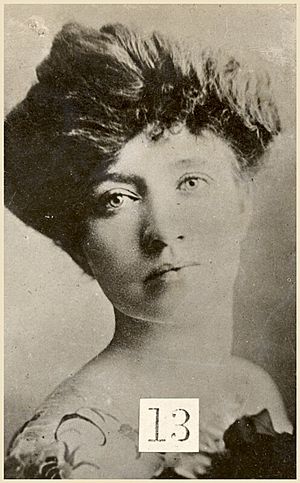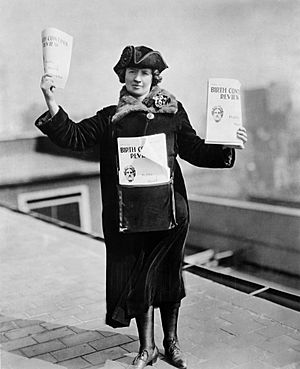Kitty Marion facts for kids
Quick facts for kids
Kitty Marion
|
|
|---|---|

Kitty Marion c. 1913
|
|
| Born |
Katherina Maria Schafer
12 March 1871 Rietberg, German Empire
|
| Died | 9 October 1944 (aged 73) New York City, US
|
| Nationality | British |
| Occupation | actress, activist |
Kitty Marion (born Katherina Maria Schäfer, 12 March 1871 – 9 October 1944) was a brave woman from Germany. She moved to London, England, in 1886 when she was fifteen years old. Kitty became well-known for singing in music halls across the United Kingdom. She was famous for standing up for female performers. She fought against unfair treatment and for better working conditions.
In 1908, Kitty joined the Women's Social and Political Union (WSPU). This group worked for women's right to vote. She became an important suffragette in the UK. She took part in many protests, including some that caused property damage. Because of this, Kitty was arrested many times. She is known for being force-fed 232 times while on hunger strike in prison. When World War I began, she moved to the United States. There, she continued to fight for important causes.
Contents
Who Was Kitty Marion?
Early Life and Moving to England
Katherina Maria Schafer was born in Rietberg, Germany, on 12 March 1871. Her mother died from a lung illness when Kitty was only two years old. Four years later, her step-mother also passed away from the same illness. When Kitty was fifteen, her uncle secretly sent her to live with her aunt in England. This was to help her escape a difficult home life.
A Star on Stage
Even as a child, Kitty loved to sing and dance. She once said that singing and reciting came easily to her because she loved it. Soon after moving to England, she started performing on stage. She found a natural home in London's music halls. These were places where variety shows included songs and short plays. They often commented on current events. It was a lively and diverse place for artists.
When Kitty first started singing, her roles were very small. She wasn't even listed in the program. But she worked her way up. She moved from the chorus to minor roles. Eventually, she became the understudy for lead roles in big shows. These shows toured all over the UK.
Standing Up for Performers
Kitty Marion made a big difference in the music hall world. She spoke out against the unfair treatment of women performers. Working conditions for artists were often very tough. In 1906, Kitty joined groups like the Actor's Association. She also joined the Variety Artistes' Federation. Here, she openly talked about how female performers were treated.
That same year, she became publicly known. She wrote a letter to a newspaper after they criticized actors. Kitty wrote about how hard it was for women to succeed on their own talent. Many other women then wrote about their own experiences. Kitty's involvement with the suffrage movement later hurt her acting career in the UK. Agents didn't want to hire someone who caused controversy. However, when she moved to the United States, she found more chances to perform.
Fighting for Women's Rights
While helping performers, Kitty became interested in the Suffragette Movement. This movement fought for women's right to vote. She joined the Women's Social and Political Union (WSPU) in 1908. She also joined the Actresses' Franchise League in 1909. Her first job for the WSPU was selling their newspaper, Votes for Women, on the streets.
At first, Kitty didn't like selling newspapers. But she soon became very good at it. She was known as one of their best members. Kitty fully supported the WSPU's strong actions. She took part in marches where police sometimes became violent.
Protests and Prison
Kitty threw bricks through windows of post offices and grocery stores. She once threw suffragette papers through the window of the Home Office. She was also involved in protests that caused property damage. These actions were not meant to hurt people. They were designed to draw attention to the cause. For example, some actions involved setting small fires in churches or train carriages. These fires often smoked before they got big. This gave people time to get away safely.
Kitty once reported a false fire alarm and refused to pay a fine. She preferred to go to jail. She spent a month in prison with the support of other suffragettes. Her most famous act was burning down a grandstand at the Hurst Park Racecourse on June 8, 1913. She did this with another suffragette, Clara Giveen. Kitty was sentenced to three years in prison for this. While in prison, she went on hunger strike many times. She was force-fed to make her eat.
The WSPU gave Kitty Marion a special Hunger Strike Medal. It was given for her bravery.
Moving to America
At the start of World War I, Kitty had to leave the United Kingdom. There was strong anti-German feeling at the time. With help from important suffragettes, she moved to the United States. In America, she met Margaret Sanger. Kitty then started working with her. She became a well-known person in New York City. Later, she worked on a project to help children learn English.
Kitty Marion passed away in New York City on 9 October 1944.
Further Information
Kitty Marion kept a scrapbook of her activities for women's rights. This scrapbook has been made available online for everyone to see.
See also
 In Spanish: Kitty Marion para niños
In Spanish: Kitty Marion para niños
 | Aaron Henry |
 | T. R. M. Howard |
 | Jesse Jackson |


